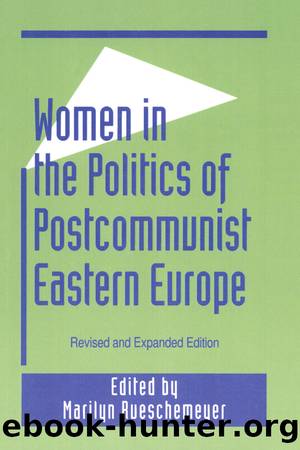Women in the Politics of Postcommunist Eastern Europe by Marilyn Rueschemeyer

Author:Marilyn Rueschemeyer [Rueschemeyer, Marilyn]
Language: eng
Format: epub
ISBN: 9780765602961
Barnesnoble:
Goodreads: 11285178
Publisher: Routledge
Published: 1993-10-31T00:00:00+00:00
Changes Since the Transition
Are women the losers in the transition? This question is often asked by social scientists (usually outside the countries undergoing the transition). Let us see.
Guaranteed full-time employment disappeared with the fall of the state-socialist economic system. With the closing or privatization of state-owned firms and factories, a large number of workers are being laid off, and hardly any new jobs are being created. Women have always been at a disadvantage when the economy collapses, in Western European countries as well as in the former state-socialist societies, because of their lower level of âhuman capital,â their household responsibilities, and the traditional views on gender roles. Hungary is an exception to this often-observed rule. Although unemployment is strikingly high and has been increasing since 1989, women are less likely to be unemployed than men. In the summer of 1992 women accounted for 41 percent of the unemployed and 48 percent of all active wage earners. The unemployment rate was 7.7 percent for women, 10.5 percent for men. Close examination reveals that this difference is due mainly to the fact that unskilled women are underrepresented among the unemployed population. Strong gender segregation by industry may have been advantageous for women in this situation: closings and privatization were more prevalent in the heavy industries, where women are less likely to be employed.24
Aggregate statistics, however, may be showing only one side of the coin: scattered evidence (interviews with employment office workers, help-wanted ads in the daily papers) suggests that young women with children are disadvantaged when they look for work because private companies require flexible schedules and full commitment to the job, and they provide no special social benefits for women. According to current estimates, about 10 percent of the people receiving unemployment benefits are actually working illegally, and men may be over-represented among this population.
Unemployment may be less of a threat to women at the moment, but the cutbacks in the financing of social services certainly increase womenâs burdens. Poverty has grown rapidly since 1989. Families that used to be able to eat out occasionally, go away for a few weeksâ vacation each year, use frozen or canned food, buy clothing in department stores, and use laundry services find themselves struggling to pay for the basic necessities. Women make up for the missing forints by preparing all meals at home, canning, preserving, darning socks, turning shirt collars, doing the laundry (while their husbands may be working at their second or third jobs). The new welfare policies are far from adequate to make up for the disadvantages created, and since women remain responsible for the children and the household, these measures have a more distressing and direct effect on them than on men.
The new employment and social security legislation passed by parliament also brought changes that potentially disadvantage women. The major concern and still a matter of debate is the action to raise the retirement age for women. During the state-socialist era women retired at 55, five years earlier than men. A
Download
This site does not store any files on its server. We only index and link to content provided by other sites. Please contact the content providers to delete copyright contents if any and email us, we'll remove relevant links or contents immediately.
| Anthropology | Archaeology |
| Philosophy | Politics & Government |
| Social Sciences | Sociology |
| Women's Studies |
The Leavers by Lisa Ko(6461)
Born to Run: by Christopher McDougall(6251)
iGen by Jean M. Twenge(4693)
Sapiens by Yuval Noah Harari(4529)
The Kite Runner by Khaled Hosseini(4416)
Spare by Prince Harry The Duke of Sussex(4188)
Bullshit Jobs by David Graeber(3172)
Livewired by David Eagleman(3114)
Goodbye Paradise(2949)
Never by Ken Follett(2872)
A Dictionary of Sociology by Unknown(2516)
Harry Potter 4 - Harry Potter and The Goblet of Fire by J.K.Rowling(2413)
The Club by A.L. Brooks(2350)
People of the Earth: An Introduction to World Prehistory by Dr. Brian Fagan & Nadia Durrani(2345)
The Social Psychology of Inequality by Unknown(2304)
Machine Learning at Scale with H2O by Gregory Keys | David Whiting(2264)
Harry Potter and the Order of the Phoenix (5) by J.K. Rowling(2224)
0041152001443424520 .pdf by Unknown(2214)
Harry Potter and the Deathly Hallows (7) by J.K. Rowling(2213)
